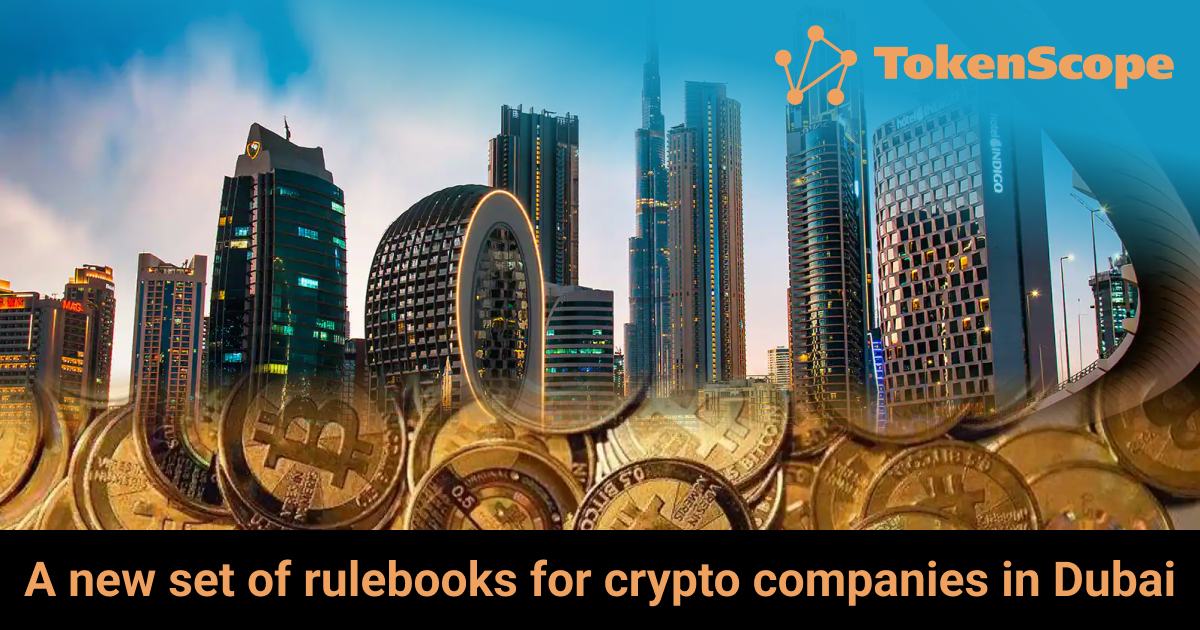A new set of rulebooks for crypto companies in Dubai

Dubai is trying hard to attract crypto companies to establish themselves in this Middle Eastern metropolis competing with its neighbor Abu-Dhabi and much more countries globally. Even though Dubai is the most populous emirate of the seven that make up the UAE and has big ambitions to become a global crypto hub there still has not been released a comprehensive regulatory framework that crypto companies can use to create or launch products.
The city’s making a play to welcome the crypto industry. Wealth funds of the UAE are investing in crypto, and many crypto companies already reside in Dubai. There is no problem to buy crypto in the city as well as exchange it for UAE’s Dirhams.
The TokenScope database includes more than 30 companies residing in Dubai that provide crypto exchange services, while among them there are both small crypto stores and OTC exchange services, as well as global platforms such as MidChains or BitOasis.
Dubai's Virtual Assets Regulatory Authority (VARA), a dedicated regulator for the industry was established just about one year ago and had previously issued only several guidelines on marketing and advertising for crypto assets.
VARA has already issued limited licenses to some of crypto’s biggest exchanges which allows them to offer standard set of services, including spot, leverage, and futures trading. Since the UAE is working to get off the FATF gray list, the Dubai authorities wanted to work out the new rules for cryptocurrency companies as best as possible, although VARA promised to release them in early 2023.
The new comprehensive rules were published on February, 7 and contain detail requirements for crypto companies from cybersecurity norms to compliance and risk-management standards. A separate set of rulebooks address specific activities like exchange, issuance, custody, broker-dealer, and advisory services.
As it is stated in the VARA’s press-release VARA's virtual assets regulatory framework is focused on the risks that each virtual asset activity presents to the market, and seeks to provide VASPs with a clear framework of rules which apply to their particular operations and business models, while maintaining a baseline market standard of compliance across core regulatory domains.
VASPs who fulfil VARA's licensing requirements will be required to comply with four Compulsory Rulebooks: Company, Compliance & Risk Management, Technology & Information, and Market Conduct.
In addition, seven activity-specific Rulebooks have been developed to cater for risks associated with the provision of each Virtual Asset activity: Advisory, Broker-Dealer, Custody, Exchange, Lending & Borrowing, Payments & Remittances, and Management & Investment.
According to the new rulebooks, any company wishing to establish crypto business in Dubai must seek authorization and receive a license from the regulatory authority before offering their services.
The new rules states that issuing anonymity-enhanced cryptocurrencies such as Monero and all VA Activities related to them are prohibited.
For custody services there is an obligation to segregate the virtual assets of each client in separate VA wallets containing the virtual assets of that client only.
Compliance and Risk Management Rulebook clarifies new regulations regarding money laundering and terrorism financing. VASPs shall employ methods which are appropriate to their particular circumstances and VA activities to continuously monitor business relationships with clients to identify any suspicious transactions to report them to the UAE Financial Intelligence Unit.
Same as in the EU and in the USA the FATF Travel Rule is obligatory for all VA transfers exceeding AED 3,500 ($1000). Prior to initiating such a transfer VASPs must obtain, and hold required and accurate originator information and required beneficiary information and make it available on request to VARA and/or other appropriate authorities.
The insider dealing (trading) is also prohibited same as unlawful disclosure, and market manipulation. A license can be revoked by VARA for various reasons, including material violation of any law, insolvency, or failure to pay a judgment by a court of the UAE. License revocation is a penalty for rules violation along with fines and other enforcement actions.




